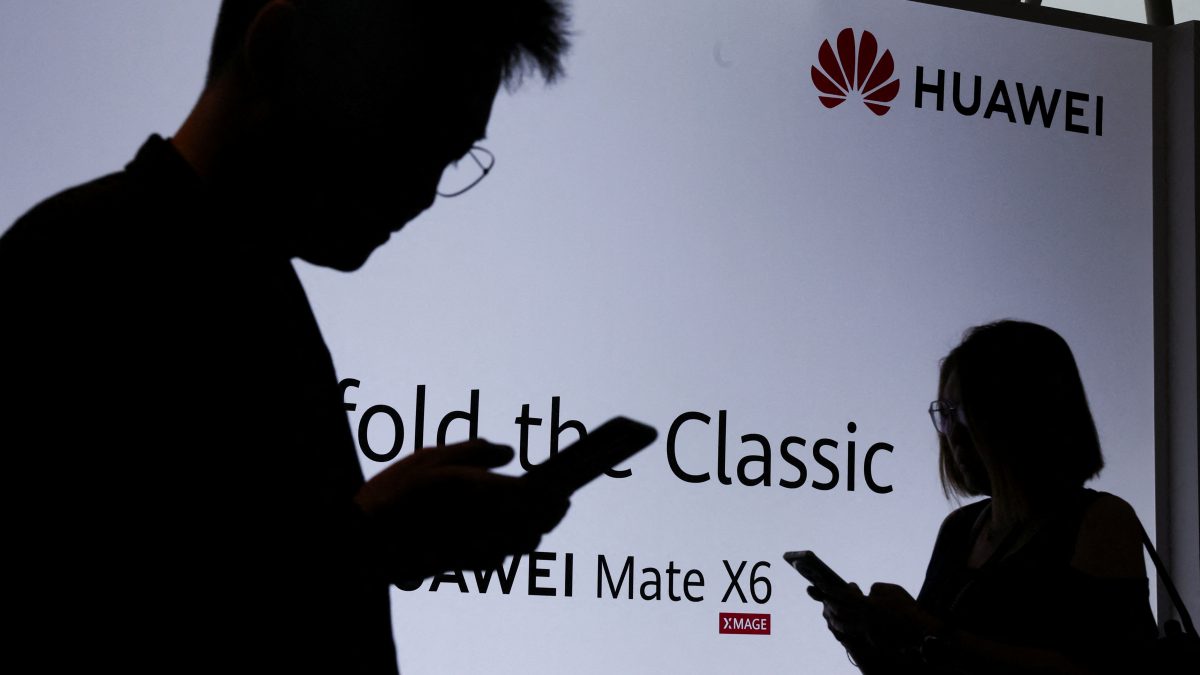The US and China are in an intense rivalry to dominate the world of artificial intelligence even as they send signals of is sending a clear message to the world: it is determined to loosen its reliance on foreign semiconductor technology and build its own foundation for the artificial intelligence era. Just a day after Beijing restricted the purchase of certain Nvidia processors, long considered the gold standard of AI computing, Huawei Technologies Co unveiled its most ambitious chip roadmap yet. Speaking at the Huawei Connect conference in Shanghai, rotating chairman Eric Xu declared, “We will follow a one-year release cycle and double compute with each release.”
This timing was no coincidence. The announcements were carefully staged to project confidence ahead of international negotiations showcasing that China can chart its own technological course. Alfred Wu of the National University of Singapore told Reuters, “China is trying to say that they’re doing very well on many fronts. Xi Jinping will be more confident when speaking with Donald Trump.”
Huawei breaks its silence on chips
For years, Huawei’s chip division operated under a cloak of secrecy, especially after US sanctions in 2019 barred it from accessing advanced chipmaking equipment. Thursday’s announcement marked the first time the company laid out a detailed, multi-year plan.
Xu revealed timelines for both the Ascend AI processors and Kunpeng server chips, positioning them as the backbone of China’s push to create “super clusters” — massive computing systems that link tens of thousands of processors to rival Nvidia-powered supercomputers. The roadmap includes the Ascend 950 in 2026, followed by new iterations every year through 2028, while supernodes such as the Atlas 950 and 960 will support up to 15,488 chips, Reuters reported.
What sets this announcement apart is its scale and ambition. Huawei is promising not just chips, but entire AI infrastructures that could power industries from cloud computing to scientific research. “Huawei is leveraging its strengths in networking, along with China’s advantages in power supply, to aggressively push supernodes and offset lagging chip manufacturing,” explained Wang Shen of Omdia.
Tencent opts for domestic hardware
Huawei is not alone in this new wave of public swagger. Chinese internet giant Tencent also confirmed this week that it had fully adapted its AI computing infrastructure to run on homegrown processors. Speaking at Tencent’s Global Digital Ecosystem Summit, cloud president Qiu Yuepeng said the firm was now using “mainstream domestic chips” and tailoring its AI systems accordingly, Tom’s Hardware reported.
Dowson Tong Tao-sang, Tencent’s senior executive vice president, added that the company was cooperating with “multiple domestic chip companies” to match hardware with specific AI workloads. Tencent, once a major customer of Nvidia, is now signalling that its long-term strategy lies in aligning closely with Chinese silicon.
This is not merely a cost-saving exercise. With Washington tightening export controls and Beijing warning firms against US chips, local champions like Tencent must ensure supply continuity. “For Tencent, the company now has to factor in both geopolitics and supply continuity into its decision-making,” the South China Morning Post noted.
A new data centre show of strength
The wave of announcements continued with state-owned telecom giant China Unicom, which unveiled a massive new data centre in Qinghai province. Valued at $390 million, the facility is powered by nearly 23,000 AI processors developed by Alibaba’s chip unit T-Head and other domestic suppliers such as MetaX, Biren Tech and Zhonghao Xinying.
When fully completed, the facility will boast computing power of 20,000 petaflops, making it one of the largest AI data centres in the world. State broadcaster CCTV emphasised that 72 per cent of the processors came from Alibaba’s T-Head division. That chip, known as the PPU, incorporates advanced HBM2e memory, putting it in direct competition with Nvidia’s H20, the most sophisticated product the US firm is currently allowed to sell in China.
Growing swagger of Chinese tech
Bloomberg described the current moment as one of “growing public swagger” by Chinese tech companies. From Huawei’s roadmap to Alibaba’s surging chip projects and from Tencent’s pivot to China Unicom’s data centre, a wave of announcements has triggered a $240 billion rally in Chinese tech stocks.
Investors are betting that these projects will eventually result in real, scalable products, even if the chips themselves remain inferior to Nvidia’s in raw performance. “Huawei unveiled an ambitious AI chip roadmap,” said Forrester Research analyst Charlie Dai, “While Huawei acknowledges its chips lag behind Nvidia in per-chip performance, it compensates with massive clustering, proprietary interconnect protocols and cost advantages.”
Alibaba’s earnings in late August, which showed a triple-digit jump in AI-related sales, sparked a wave of enthusiasm that has lifted the Hang Seng Tech Index to its highest level since 2021. Baidu, Cambricon and other Chinese chip firms have also seen share prices soar as Beijing ramps up its rhetoric around “self-reliance.”
The Nvidia question
Yet for all the noise, one fact remains stubbornly true. Nvidia still dominates global AI computing. Despite Washington’s export restrictions, the California-based company holds such a lead that even established rivals like AMD and Intel are “relegated to also-rans in the hot AI space”.
China’s domestic chips often struggle to match Nvidia’s flagship GPUs in training efficiency, power consumption and developer support. As one Chinese engineer told Reuters, “Nvidia’s chips perform better.” That is why Beijing’s strategy increasingly emphasises scale — clustering tens of thousands of domestic chips together to achieve aggregate performance comparable to Nvidia’s offerings.
The US has tried to ringfence this dominance by banning the export of cutting-edge GPUs allowing only downgraded versions such as the H20 into China. But as the recent ban on Nvidia sales shows, Beijing is prepared to block even those concessions in favour of bolstering its own ecosystem.
A calculated escalation
The ban on Nvidia and the fanfare around domestic alternatives reflect not just technological ambition, but also geopolitical manoeuvering. As Alfred Wu of the National University of Singapore put it, “People assume that tensions will be eased… but I’m thinking this is not the case, actually it’s quietly escalating.”
Beijing appears determined to project technological self-confidence at a time when trade talks with Washington remain fraught. By unveiling chip roadmaps and data centre projects, Chinese companies are helping the state tell a story of resilience and independence.
Can China close the gap?
The central question is whether these ambitious plans can deliver at scale. Many of China’s homegrown chips are produced in limited volumes constrained by US restrictions on advanced lithography and equipment. Washington continues to pressure suppliers like ASML and Taiwan Semiconductor Manufacturing Co to withhold their most advanced technology from Chinese firms.
For now, China’s strategy is to lean into strengths where it can. That means designing chips optimised for clustering, using its massive energy resources to power supernodes and building industrial policy around AI sovereignty.
The developments of the past week highlight the shifting dynamics of global technology. By banning Nvidia chips and promoting Huawei’s long-term roadmap, Tencent’s future plans and China Unicom’s massive data centre, Beijing is setting the stage for a prolonged contest over AI supremacy.
But for all the talk of “super clusters” and domestic innovation, the reality is that Nvidia remains the benchmark. China’s chip champions may succeed in building clusters of millions of processors, but unless they can match Nvidia in efficiency and ecosystem support, the US firm will continue to define the cutting edge of AI hardware.
End of Article

)
